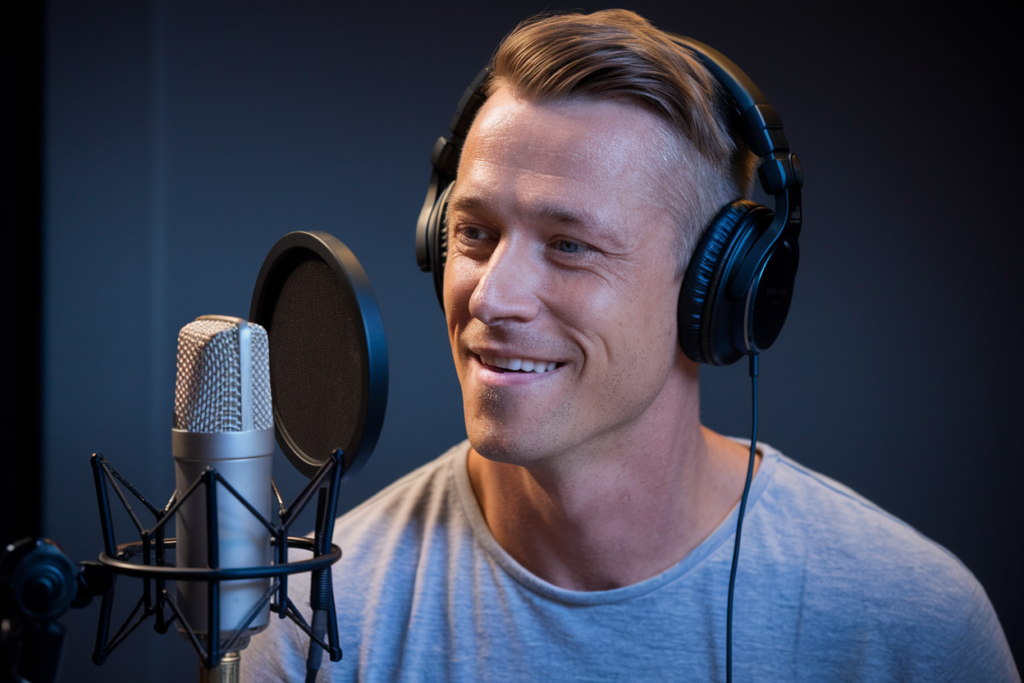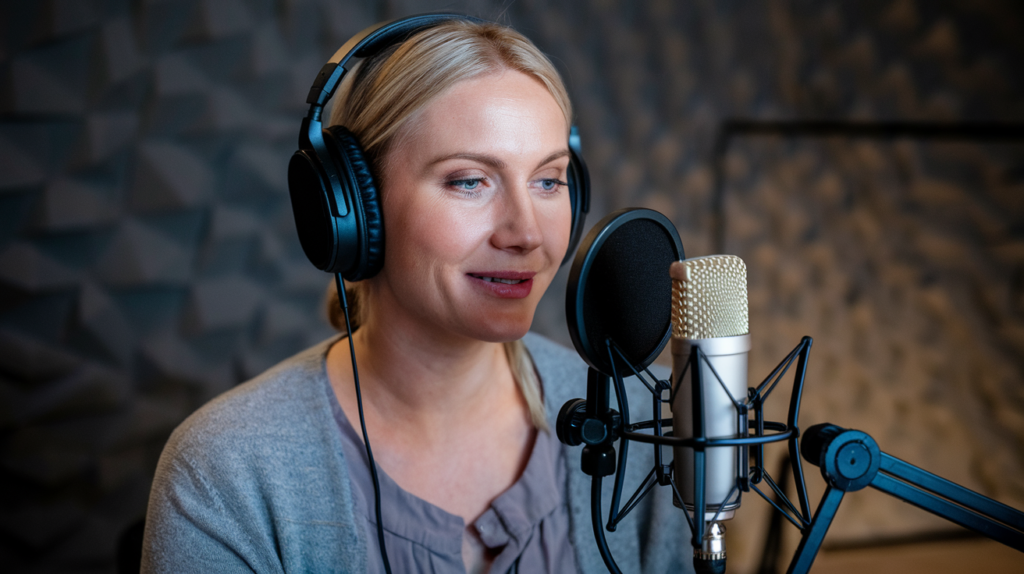Key Takeaways
- Diverse Accents: Australian English features a variety of accents, including General, Broad, and Cultivated Australian, each with unique characteristics essential for voice acting.
- Historical Context: Understanding the evolution of Australian English from British settlers and Indigenous languages informs how voice actors approach character portrayals.
- Pronunciation & Vocabulary: Key pronunciation traits and distinct vocabulary (e.g., “arvo,” “biscuit”) enrich performances and help create relatable characters.
- Performance Adaptability: Voice actors must adapt their performance styles to match different accents, enhancing emotional delivery and audience connection.
- Phonetic Training Importance: Consistent phonetic training is crucial for mastering nuances in accent variations and improving overall performance quality.
- Utilizing Practice Resources: Engaging with resources like podcasts, audiobooks, and workshops can significantly enhance understanding and proficiency in Australian English dialects.
Ever wondered how mastering Australian English dialects can elevate your voice acting career? With a rich tapestry of accents and regional variations, Australia offers a unique challenge for voice actors looking to stand out. Whether you’re aiming for the laid-back charm of a Sydney local or the rugged tones from the Outback, understanding these dialects is essential.
Overview of Australian English Dialects
Australian English features a rich tapestry of dialects that reflect the country’s diverse cultural landscape. Understanding these nuances is essential for voice actors aiming to connect authentically with their audience.
Historical Background
The evolution of Australian English stems from a blend of influences, including British settlers and Indigenous languages. Initially, convicts and settlers brought various regional accents from England, which melded over time. This fusion created distinct speech patterns recognized today as Australian English. The historical context informs how you approach different characters or settings in your voice work.
Regional Variations
Australia’s vast geography contributes to notable regional variations in accent and pronunciation.
- General Australian: This accent dominates urban areas, characterized by its broad vowels and relaxed intonation.
- Broad Australian: Often associated with rural communities, this accent has a more pronounced nasal quality and unique expressions.
- Cultivated Australian: More common among educated urbanites, this accent mirrors British pronunciations while retaining some local features.
Familiarizing yourself with these variations enhances your versatility as a voice actor. Each regional dialect carries specific traits that can shape character portrayals in scripts or performances effectively.
Key Characteristics of Australian English
Australian English features unique traits that set it apart from other English dialects. Understanding these characteristics enhances your ability as a voice actor to connect authentically with audiences.
Pronunciation Features
Pronunciation plays a significant role in shaping the identity of Australian English. Most notably, vowel sounds differ markedly from American or British accents. For example, the broad accent often elongates vowels, creating distinctions between words like “mate” and “might.” Intonation patterns also vary; Australians frequently use rising intonation at the end of statements, making them sound like questions. This feature can add an engaging twist to your voiceovers, drawing listeners in.
Vocabulary Differences
Australian English includes unique vocabulary not commonly found in other variants. Terms like “arvo” for afternoon and “biscuit” for cookie reflect local culture and lifestyle. Additionally, slang is pervasive; phrases such as “fair dinkum” signal authenticity while adding color to conversations or performances. As a voice artist, incorporating this specialized vocabulary into your scripts helps create more relatable characters and enriches your storytelling capabilities.
Understanding these key characteristics will elevate your skills as a voice actor working with Australian dialects, enhancing both versatility and audience engagement in various projects.
Importance for Voice Actors
Mastering Australian English dialects is essential for voice actors. Understanding these dialects not only enhances your versatility but also elevates your connection with audiences.
Understanding Dialect Nuances
Grasping the nuances of Australian English enriches your performances. Each accent, from General Australian to Broad and Cultivated, carries distinct characteristics. For example, Broad Australian often features elongated vowel sounds and unique intonation patterns that set it apart from other English forms. Familiarity with these differences allows you to embody various characters authentically, making your voiceover work resonate more deeply with listeners. You’ll find that mastering slang like “arvo” or expressions such as “fair dinkum” can add layers to your storytelling.
Adapting Performance Styles
Adapting your performance style is crucial in voice acting. Different accents require varied emotional deliveries and pacing; capturing the relaxed vibe of a Sydney resident contrasts sharply with portraying the ruggedness of Outback accents. Your ability to switch between styles not only showcases your talent as a voice artist but also attracts diverse projects that seek authenticity in their narration or character portrayal. Embracing this adaptability sets you apart in a competitive field, solidifying your reputation as a skilled voice over actor capable of bringing any script to life.
By honing these skills, you position yourself as a sought-after talent who understands the intricacies of regional variations within Australian English—a vital asset in delivering compelling and relatable performances.
Techniques for Mastering Australian English Dialects
Mastering Australian English dialects involves understanding their unique characteristics and practicing consistently. Voice actors can elevate their performances by honing these techniques.
Phonetic Training
Phonetic training plays a crucial role in mastering Australian accents. Focus on listening to native speakers and mimicking their sounds. Pay attention to vowel shifts, such as the diphthong in “day” sounding more like “die.” Practice tongue placement for consonants like ‘t’ and ‘d,’ which may sound softer or more pronounced depending on the dialect. Use resources like the International Phonetic Alphabet (IPA) to familiarize yourself with phonetic symbols specific to Australian English. Recording your voice while practicing helps identify areas needing improvement, enhancing your overall performance.
Practice Resources
Utilize various practice resources to immerse yourself in Australian English dialects. Online platforms offer video tutorials featuring native speakers discussing common phrases and slang used across Australia. Podcasts are another excellent way to absorb natural speech patterns—find shows that feature conversational content among locals. Engaging with audiobooks narrated by Australian voice artists enriches your understanding of rhythm and intonation peculiarities within different accents. Joining local workshops or online forums allows you to connect with fellow voice actors, share experiences, and receive constructive feedback on your accent work.
By integrating phonetic training with diverse practice resources, you’ll develop a strong foundation in Australian English dialects, making you a versatile voice talent ready for any role.
Conclusion
Mastering Australian English dialects is a game changer for your voice acting career. The rich diversity in accents across Australia allows you to connect deeply with your characters and audience. By honing your skills in General, Broad, and Cultivated Australian accents, you’ll enhance your versatility as a performer.
Engaging with native speakers and utilizing phonetic training can be incredibly beneficial. Immerse yourself in resources tailored to these dialects for authentic practice. As you embrace the nuances of Australian English, you’ll not only elevate your performances but also stand out in a competitive industry.
Your dedication to mastering these dialects will unlock new opportunities and help solidify your reputation as an adaptable and relatable voice actor.
Frequently Asked Questions
Why is mastering Australian English dialects important for voice actors?
Mastering Australian English dialects is crucial for voice actors as it enhances their versatility and ability to portray characters authentically. Understanding the diverse accents helps them connect better with audiences, making performances more relatable and compelling.
What are the main types of Australian English accents?
The main types of Australian English accents include General Australian, Broad Australian, and Cultivated Australian. Each accent has unique characteristics in pronunciation and intonation that can significantly impact a voice actor’s performance.
How did Australian English evolve?
Australian English evolved from a blend of influences, primarily British settlers’ speech and Indigenous languages. This rich cultural background contributed to the distinct dialects recognized today, reflecting Australia’s diverse heritage.
What are some key features of Australian English pronunciation?
Key features of Australian English pronunciation include unique vowel sounds that differ from American or British accents. The broad accent often elongates vowels and showcases specific intonation patterns that contribute to its distinctive sound.
How can voice actors practice mastering these dialects?
Voice actors can practice by listening to native speakers, using resources like online tutorials, podcasts, and audiobooks narrated by Australians. Engaging in local workshops or forums also provides valuable feedback for skill development.
Are there any specific vocabulary terms to know in Australian English?
Yes! Some common vocabulary terms include “arvo” (afternoon) and “fair dinkum” (authentic). Familiarity with such slang enriches a voice actor’s performances and storytelling abilities.
What role does phonetic training play in mastering these dialects?
Phonetic training helps voice actors understand vowel shifts and consonant pronunciations specific to Australian English. Utilizing tools like the International Phonetic Alphabet (IPA) aids in developing accurate speech patterns essential for authentic performances.
Can understanding regional variations enhance my acting skills?
Absolutely! Understanding regional variations allows you to adapt your performance style effectively. Capturing the relaxed vibe of Sydney residents versus the ruggedness of Outback accents makes your portrayal more nuanced and believable.







